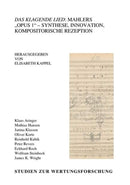| タイトル | Das klagende Lied: Mahlers opus 1 |
| サブタイトル | Synthese, Innovation, kompositorische Rezeption |
| 出版社 | Universal Edition・ユニヴァーサル・エディション |
| シリーズ名 | Studien zur Wertungsforschung. Band 54 |
| 品番 | 9790008085130 |
| 編曲者 | Elisabeth Kappel |
| 出版番号 | UE26854 |
| ISMN | 9790008085130 |
| ISBN | 9783702471828 |
| その他 | with contributions by Peter Revers,Mathias Hansen,Eckhard Roch,Wolfram Steinbeck,Reinhold Kubik,Klaus Aringer,Oliver Korte,Janina Klassen and James K. Wright |
Musical practice is permeated by valuation and judgment. Audiences judge performers and composers, performers dote on and honour certain works while disregarding others, composers respect audiences or despise them. How do such valuations come about? Why do some valuations prevail while others fade into oblivion? And which Standards, if any, underlie them? Such matters must be explored ever anew, for established evaluations lose credit just as fresh ones arise and spread. In 1968 Harald Kaufmann founded Studien zur
Wertungsforschung, enlisting the resources of philosophical aesthetics for understanding questions such as these. Valuations, Kaufmann argued, are not mere opaque feelings lying outside the realm of reasoned dispute. Rather,
valuations are amenable to and stand in need of reflection and argument. Human attitudes manifest a diversity of values. There may not be a single elevated stance - such as an 'aesthetic standpoint' or the aspiration toward
beauty - from which we are able to contemplate the entirety of musical values. On the other hand, abstaining from valuation, or pretending that valuation is beyond the realm of scholarly inquiry are not viable options for the study of music. To the contrary, inquiry into these subjects is a prerequisite for a full understanding of music.



